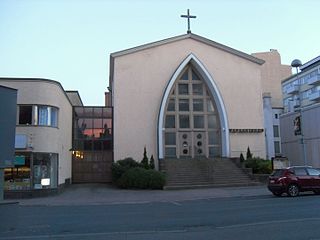The Methodist Church may refer to one of a number of denominations of Methodism, some of which included a national description in the title, including:

Methodism, also called the Methodist movement, is a group of historically related denominations of Protestant Christianity whose origins, doctrine and practice derive from the life and teachings of John Wesley. George Whitefield and John's brother Charles Wesley were also significant early leaders in the movement. They were named Methodists for "the methodical way in which they carried out their Christian faith". Methodism originated as a revival movement within the 18th-century Church of England and became a separate denomination after Wesley's death. The movement spread throughout the British Empire, the United States, and beyond because of vigorous missionary work, today claiming approximately 80 million adherents worldwide.
The United Methodist Church (UMC) is a worldwide mainline Protestant denomination based in the United States, and a major part of Methodism. In the 19th century, its main predecessor, the Methodist Episcopal Church, was a leader in evangelicalism. The present denomination was founded in 1968 in Dallas, Texas, by union of the Methodist Church and the Evangelical United Brethren Church. The UMC traces its roots back to the revival movement of John and Charles Wesley in England, as well as the Great Awakening in the United States. As such, the church's theological orientation is decidedly Wesleyan. It embraces liturgical worship, holiness, and evangelical elements.

The Methodist Episcopal Church (MEC) was the oldest and largest Methodist denomination in the United States from its founding in 1784 until 1939. It was also the first religious denomination in the US to organize itself on a national basis. In 1939, the MEC reunited with two breakaway Methodist denominations to form the Methodist Church. In 1968, the Methodist Church merged with the Evangelical United Brethren Church to form the United Methodist Church.

The Holiness movement is a Christian movement that emerged chiefly within 19th-century Methodism, and to a lesser extent other traditions such as Quakerism, Anabaptism, and Restorationism. The movement is Wesleyan in theology, and is defined by its view of personal sin, and emphasis on the doctrine of a second work of grace generally called entire sanctification or Christian perfection. For the Holiness Movement "the term 'perfection' signifies completeness of Christian character; its freedom from all sin, and possession of all the graces of the Spirit, complete in kind." A number of evangelical Christian denominations, parachurch organizations, and movements emphasize those beliefs as central doctrine.
CME. or cme, can refer to any of the following:

A Methodist local preacher, also known as a licensed preacher or local pastor, is a layperson who has been accredited by the Methodist Church to lead worship and preach on a frequent basis. With separation from the Church of England by the end of the 18th century, a clear distinction was recognised between itinerant ministers (presbyters) and the local preachers who assisted them. Local preachers have played an important role in Methodism since the earliest days of the movement, and have also been important in English social history. These preachers continue to serve an indispensable role in the Methodist Church of Great Britain, in which the majority of church services are led by laypeople. In certain Methodist connexions, a person becomes a local preacher after obtaining a license to preach. In many parts of Methodism, such as the Allegheny Wesleyan Methodist Connection, there are thus two different tiers of ministers—licensed preachers and ordained elders.
The Primitive Methodist Church is a Methodist Christian denomination with the holiness movement. It began in England in the early 19th century, with the influence of American evangelist Lorenzo Dow (1777–1834).
St. Luke's Church may refer to:
The Methodist Church of Great Britain is a Protestant Christian denomination in Britain, and the mother church to Methodists worldwide. It participates in the World Methodist Council, and the World Council of Churches among other ecumenical associations.

The Bible Christian Church was a Methodist denomination founded by William O’Bryan, a Wesleyan Methodist local preacher, on 18 October 1815 in North Cornwall. The first society, consisting of just 22 members, met at Lake Farm in Shebbear, Devon. Members of the Church were sometimes known as Bryanites, after their founder.

A free church is a Christian denomination that is intrinsically separate from government. A free church does not define government policy, and a free church does not accept church theology or policy definitions from the government. A free church also does not seek or receive government endorsements or funding to carry out its work. The term is especially relevant in countries with established state churches. An individual belonging to a free church is known as a free churchperson or historically, a free churchman.
Methodism is a Protestant Christian movement encompassing numerous denominations.
The Evangelical Church of North America (ECNA) is a Wesleyan-Holiness, Protestant Christian denomination headquartered in Clackamas, Oregon. As of 2000, the Church had 12,475 members in 133 local churches. The Church sponsors missionaries in seven countries.
Cargill is a privately held American multinational corporation.
Bethel Methodist Church or Bethel Methodist Episcopal Church or Old Bethel Methodist Church may refer to:
United Methodist Church may refer to:
First Methodist Church or variations with Building may refer to:
The Wesleyan Church is a Methodist Christian denomination aligned with the holiness movement.

The history of Methodism in the United States dates back to the mid-18th century with the ministries of early Methodist preachers such as Laurence Coughlan and Robert Strawbridge. Following the American Revolution most of the Anglican clergy who had been in America came back to England. John Wesley, the founder of Methodism, sent Thomas Coke to America where he and Francis Asbury founded the Methodist Episcopal Church, which was to later establish itself as the largest denomination in America during the 19th century.